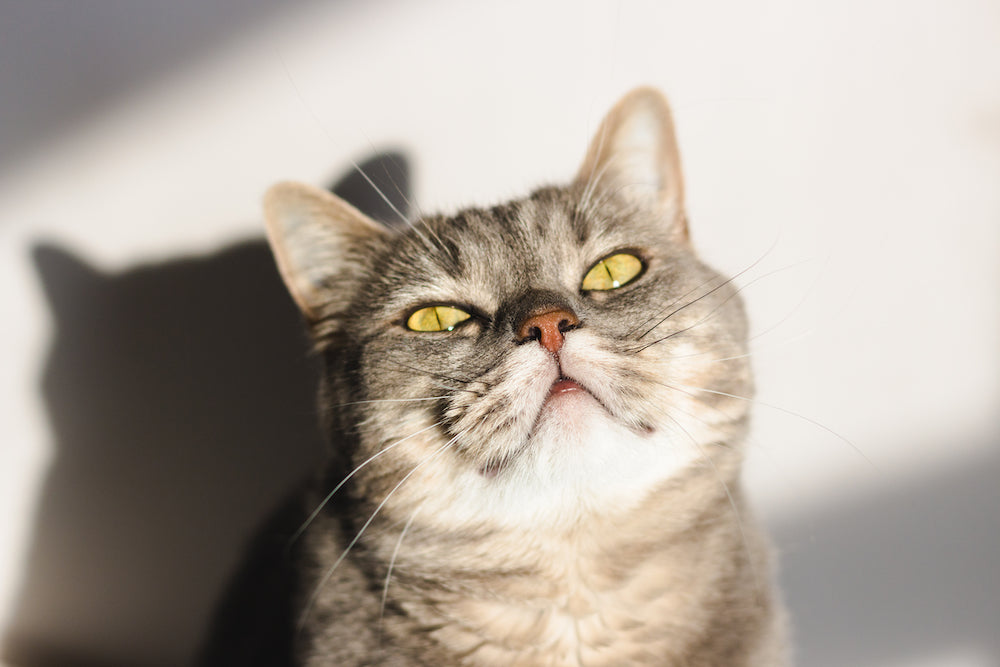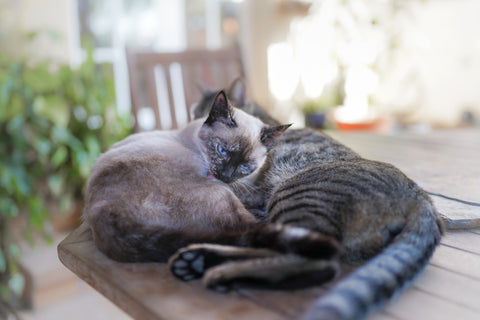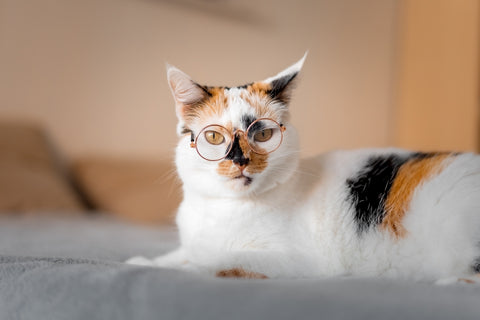
As Basepaws sees it, a deeper understanding of the genetic factors that contribute to feline longevity can support cats to live longer, but more importantly, do so in ways that help them enjoy their golden years with fewer instances of pain and illness. To make this a reality for all cats, Basepaws initiated a longevity research partnership with Ernie Ward, DVM, CVFT, founder of Project 25, which aims to extend feline life expectancy by 25 percent by the year 2025. Project 25 goals include increasing longevity, improving quality of life, decreasing disease and pain, and elevating the ways that we interact and communicate with our pets. As we close out November’s theme of Senior Cat Month, we’d like to share some of the details of Basepaws’ longevity research as part of this exciting collaboration.
There are ongoing studies focused on canine longevity, but no such studies exist for cats. Project 25 is one of many in which Basepaws is participating to put cats front-and-center in pioneering genetics and pet health research. This work complements the convenient at-home health testing products that we provide pet parents like you to help cats everywhere live longer, healthier, and happier lives.
The future of pet health begins with a better understanding of the building blocks of life. Basepaws is leading the next generation of diagnostic testing that will allow us to prevent disease, enhance quality of life, and extend longevity. I'm honored to be a part of this groundbreaking company committed to creating a better future for animals.
~Dr. Ernie Ward
Though individualized feline healthcare strategies are important at every life stage, they are especially important as our cats move into the senior years of life (10 years of age and older). As discussed in the recently published 2021 AAFP Feline Senior Care Guidelines, the incidence of many diseases increases as cats age, and comorbidities also become more common.
As a part of Project 25, Basepaws aims to discover the genetic predispositions of thriving, healthy senior cats who live well into their late teens and even twenties. Longevity is a complex trait, and we are actively recruiting a large number of senior cats, aged 17 years and older, to maximize our chances of identifying longevity-related genetic markers. Our goal is to recruit a total of 500 cats for this research endeavor, and we want you to be a part of this important work!
Applications for Basepaws’ Longevity Research
The potential applications for this research cannot be understated. Previous studies have shown that there are clear genetic variants and pathways associated with longer lifespan across the animal kingdom, most prominently in mice, C. elegans, Drosophila, and yeast. Through our work with Project 25, Basepaws will initiate a new body of scientific research on the genetic variants associated with feline longevity, and our research outcomes have the potential to be life-changing not only for cats, but for humans as well.
Believe it or not, cats have 90.2 percent of their DNA in common with humans. Cats are genetically closer to humans than dogs, who only have around 84 percent of their DNA in common with us. This impressive amount of genomic similarity between cats and humans means that Basepaws’ feline longevity research could also inform and complement human longevity studies.
Through our partnership with Project 25, Basepaws aims to identify potential novel therapeutic targets for age-related chronic feline diseases, such as chronic kidney disease and hypertrophic cardiomyopathy (HCM). Cats have been shown to be great models for certain diseases in humans—there are over 200 inherited human diseases that closely resemble inherited conditions in cats, and HCM is one of them. Our genetics research on feline longevity could have important implications in the human therapeutics space, with the potential for identifying new drug targets for age-related human diseases.
The 2021 AAHA/AAFP Feline Life Stage Guidelines emphasize that the medical history and examination of mature adult and senior cats should be focused on early detection of disease. Our ultimate goal is to develop an at-home test screening for genetic markers associated with longer or shorter feline lifespan and healthspan. This test will build on the screening we currently do for 43 genetic conditions (represented by 65 health markers) through our existing Cat Health DNA test. These pre-diagnostic tools will help guide pet parents’ and veterinarians’ decisions on the optimal timing to start implementing senior care routines, or for taking certain preventive measures to ameliorate a cat’s particular disease risk. Our tests aim to help detect disease earlier, and with every cat tested, we take one step closer to supporting better health and wellness for all cats.
Become a Basepaws Citizen Science Trailblazer
The Basepaws longevity research project is centered on a citizen science approach, where you are an integral part of helping us “let cats do science”! Along with veterinary clinics, research institutions, and partners like Dr. Ward of Project 25, we are proud to partner with amazing pet parents like you who contribute to these efforts as invaluable members of our ever-growing citizen science community.
We are actively recruiting cats in the U.S. aged 17 years or older to participate in this longevity research study. If your cat qualifies* and we don’t already have their DNA sample in our lab, you will be sent an oral swab kit that helps you to collect a DNA sample easily and painlessly from your cat’s mouth. Basepaws ships the kit to you for free** and provides you with a convenient prepaid shipping label and instructions on how to ship it back to our U.S.-based lab. Additionally, you will be asked to fill out a short questionnaire and provide the cat’s medical records. All qualifying participants (who are not already Basepaws customers with existing reports) will also receive the company’s signature cat DNA report—free of charge—as a huge thank you for your contribution to this work!
Together, we can usher in a future where our cats live longer, and with a higher quality of life that doesn’t include pain and illness.
*A requirement for application will be to submit your cat's medical records that validate the medical condition being researched, in this case, age. You will need to request these medical records from your cat's veterinarian. See more FAQs at the bottom of the Basepaws Research page for other participation considerations.
**U.S. participants only. Basepaws does not cover international shipping costs.



